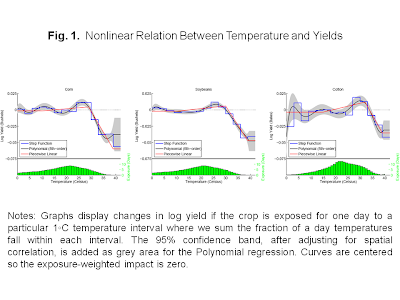Nonlinear Temperature Effects Indicate Severe Damages to U.S. Crop Yields Under Climate Change

It's been a long haul, but my coauthor Wolfram Schlenker and I have finally published our article with the title of this blog post in the Proceedings of the National Academy of Sciences . We've been told that it would show up on the early-edition website this week. It hasn't shown up there yet so I guess it will come out tomorrow [Friday 8/28], probably late afternoon EST. UPDATE: You can find the article here . We set out to develop a better statistical model linking weather and U.S. crop yields for corn, soybeans and cotton, the largest three crops in the U.S. in production value. Our major new finding is that (by far) the best predictor of yield is a measure of extreme heat: how much temperatures exceed about 29C (84F) during the growing season. The threshold varies somewhat by crop--29C is the threshold for corn. Below this threshold, warmer temperatures are more beneficial for yields, but the damaging effects of temperatures much above 29C are staggeringly large. A
